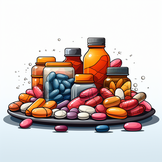Does sildenafil affect blood pressure and heart rate?
- Sildenafil and Its Primary Uses
- Safety and Clinical Significance of Sildenafil's Effects on Blood Pressure and Heart Rate
- Studies Conducted by The Johns Hopkins University School of Medicine
- Sildenafil's Impact on Heart Rate
- Sildenafil's Impact on Heart Function Under Normal Conditions
- Interaction of Sildenafil with Antihypertensive Medications
- Sildenafil's Effects on Chronic High Blood Pressure
- The Effect of Sildenafil on Blood Pressure
- The Role of Sildenafil in Chemically Induced Stress and Heart Function
- Wrapping Up: Sildenafil, Blood Pressure, and Heart Rate

Sildenafil and Its Primary Uses
Sildenafil is a pharmaceutical drug often marketed under the name Viagra for treating erectile dysfunction, but it also has utility in managing pulmonary hypertension, a condition characterized by high blood pressure in the arteries of the lungs. By enhancing the effects of nitric oxide, a natural chemical the body produces to relax muscles in the penis and increase blood flow, sildenafil assists men in maintaining an erection.
Safety and Clinical Significance of Sildenafil's Effects on Blood Pressure and Heart Rate
Given its mechanism of action, sildenafil has a direct impact on the cardiovascular system, including effects on blood pressure and heart rate. Generally, it is considered safe for most individuals, with rare instances of serious side effects. It works by causing blood vessel dilation, which can result in a decrease in blood pressure. However, the impact on heart rate is less clear and can vary based on individual health conditions and circumstances.
Studies Conducted by The Johns Hopkins University School of Medicine
The Johns Hopkins University School of Medicine has conducted extensive research to examine the safety and impact of sildenafil on the cardiovascular system. A study published showed that even with its vasodilatory properties, sildenafil does not lead to a significant increase in heart rate in healthy individuals, suggesting a level of safety in its clinical use.
Sildenafil's Impact on Heart Rate
Though sildenafil primarily affects blood flow and pressure, it has been studied for its impact on heart rate. Typically, heart rate is not substantially affected in healthy individuals taking sildenafil. However, caution should be exercised for individuals with heart conditions as sildenafil might interact with their medications or exacerbate their conditions.
Sildenafil's Impact on Heart Function Under Normal Conditions
Under normal conditions, sildenafil has a minor impact on heart function. This is largely because sildenafil's primary mechanism is to facilitate blood flow through dilation of the blood vessels, not altering heart rhythm or contractility. Therefore, in healthy individuals, sildenafil is unlikely to negatively affect heart function.
Interaction of Sildenafil with Antihypertensive Medications
Many individuals question if sildenafil can be taken with blood pressure-lowering drugs or antihypertensive medications. Generally, it can be, but with caution and medical supervision. Sildenafil, due to its blood vessel dilating effect, can intensify the action of these medications leading to significantly lowered blood pressure. Therefore, it is recommended to discuss with a healthcare provider before using sildenafil in conjunction with such drugs.
Sildenafil's Effects on Chronic High Blood Pressure
Sildenafil has been noted to be effective in treating pulmonary hypertension, a form of high blood pressure that affects the arteries in the lungs and the right side of the heart. Though it can potentially lower systemic blood pressure slightly, it is not primarily used for treating chronic high blood pressure. Patients with high blood pressure should always consult their doctors before starting sildenafil.
The Effect of Sildenafil on Blood Pressure
As a vasodilator, sildenafil causes blood vessels to expand, which can lead to a decrease in blood pressure. While this effect can be beneficial for individuals with pulmonary hypertension, it can also lead to hypotension, or low blood pressure, particularly in individuals taking certain types of blood pressure medications.
The Role of Sildenafil in Chemically Induced Stress and Heart Function
Sildenafil has been researched in relation to heart function under conditions of chemically induced stress. The drug appears to have protective qualities, helping to maintain normal heart function during stress by facilitating sufficient blood flow. However, it is always essential for patients to consult with a healthcare professional before using sildenafil in stressful conditions.
Wrapping Up: Sildenafil, Blood Pressure, and Heart Rate
So, does sildenafil affect blood pressure and heart rate?
Yes, it does, mainly by lowering blood pressure due to its vasodilatory effects, while its effect on heart rate is generally minimal in healthy individuals.However, these effects can vary based on individual health conditions and the use of other medications, especially blood pressure-lowering drugs.Therefore, while sildenafil is generally safe for most people, it is always best to consult with a healthcare provider before its use, particularly for those with pre-existing cardiovascular conditions.In terms of dosage for patients with high blood pressure, again, medical advice should be sought to avoid any potential health risks.



